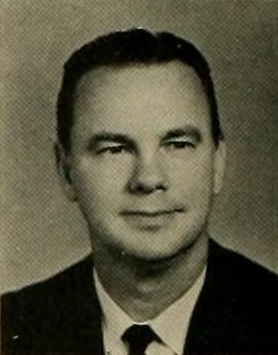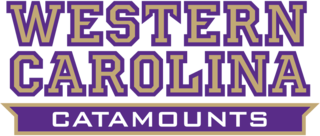Related Research Articles

Robert Lee "Jack" Boone was an American football player and coach; most notably he served as head coach for the college football team of East Carolina College for ten years.

The Appalachian State Mountaineers football team is the intercollegiate American football team representing Appalachian State University in Boone, North Carolina. The Mountaineers have competed in the Football Bowl Subdivision (FBS) and the Sun Belt Conference since 2014. Appalachian plays its home games in Kidd Brewer Stadium, named after former head coach Kidd Brewer, whose 1937 squad was unbeaten and unscored upon during the regular season, outscoring opponents 206–0.
The 1953 East Carolina Pirates football team was an American football team that represented East Carolina College as a member of the North State Conference during the 1953 college football season. In their second season under head coach Jack Boone, the team compiled a 8–2 record and as conference champions.
The 1939 Appalachian State Mountaineers football team was an American football team that represented Appalachian State Teachers College as a member of the North State Conference during the 1939 college football season. In their first year under head coach Flucie Stewart, the Mountaineers compiled an overall record of 7–1–2, with a mark of 3–0–1 in conference play, and finished as NSC co-champion.
The 1941 Appalachian State Mountaineers football team was an American football team that represented Appalachian State Teachers College as a member of the North State Conference during the 1941 college football season. In their second year under head coach R. W. "Red" Watkins, the Mountaineers compiled an overall record of 4–5, with a mark of 2–3 in conference play, and finished 4th in the NSC.
The 1949 Appalachian State Mountaineers football team was an American football team that represented Appalachian State Teachers College as a member of the North State Conference during the 1949 college football season. In their third year under head coach E. C. Duggins, the Mountaineers compiled an overall record of 9–3, with a mark of 6–2 in conference play, and finished second in the NSC. State concluded their season with a victory over Catawba at the Pythian Bowl.
The 1950 Appalachian State Mountaineers football team was an American football team that represented Appalachian State Teachers College as a member of the North State Conference during the 1950 college football season. In their fourth year under head coach E. C. Duggins, the Mountaineers compiled an overall record of 9–2–1, with a mark of 7–0–1 in conference play, and finished as NSC champion. State concluded their season with a losses to Emory and Henry at the Burley Bowl and against West Liberty at the Pythian Bowl.
The 1951 Appalachian State Mountaineers football team was an American football team that represented Appalachian State Teachers College as a member of the North State Conference during the 1951 college football season. In their only year under head coach Pres Mull, the Mountaineers compiled an overall record of 6–3, with a mark of 3–3 in conference play, and finished fourth in the NSC.
The 1953 Appalachian State Mountaineers football team was an American football team that represented Appalachian State Teachers College as a member of the North State Conference during the 1953 college football season. In their fifth year under head coach E. C. Duggins, the Mountaineers compiled an overall record of 6–4, with a mark of 3–3 in conference play, and finished fifth in the NSC.
The 1954 Appalachian State Mountaineers football team was an American football team that represented Appalachian State Teachers College as a member of the North State Conference during the 1954 college football season. In their seventh year under head coach E. C. Duggins, the Mountaineers compiled an overall record of 8–3, with a mark of 6–0 in conference play, and finished as NSC champion. State concluded their season with a victory over East Tennessee State at the Burley Bowl and a loss against Newberry at the Elks Bowl.
The 1966 Appalachian State Mountaineers football team was an American football team that represented Appalachian State Teachers College as a member of the Carolinas Conference during the 1966 NAIA football season. In their second year under head coach Carl Messere, the Mountaineers compiled an overall record of 3–6–1, with a mark of 2–5 in conference play, and finished seventh in the Carolinas Conference.
The 1967 Appalachian State Mountaineers football team was an American football team that represented Appalachian State University as a member of the Carolinas Conference during the 1967 NAIA football season. In their third year under head coach Carl Messere, the Mountaineers compiled an overall record of 7–3, with a mark of 5–2 in conference play, and finished second in the Carolinas Conference.
The 1973 Appalachian State Mountaineers football team was an American football team that represented Appalachian State University as a member of the Southern Conference (SoCon) during the 1973 NCAA Division I football season. In their third year under head coach Jim Brakefield, the Mountaineers compiled an overall record of 3–7–1 with a mark of 2–2 in conference play, and finished fifth in the SoCon.

The Western Carolina Catamounts football program represents Western Carolina University. The team competes in the NCAA Division I Football Championship Subdivision (FCS) and are members of the Southern Conference. Since the school's first football team was fielded in 1931, the Catamounts have a record of 364–540–23, have made two postseason appearances, and have played in one national championship game.
The 1967 Tangerine Bowl was an NCAA College Division game following the 1967 season, between West Chester and Tennessee–Martin. The most valuable players were defensive end Gordon Lambert and quarterback Errol Hook, both of Tennessee–Martin.
The Burley Bowl was a postseason college football bowl game played from 1945 through 1956. It was held each year on Thanksgiving Day in Johnson City, Tennessee, at the city's Memorial Stadium, which was demolished in July 2010. The game was part of an annual two-day tobacco festival, with the name of the bowl coming from Burley tobacco. Like some other postseason match-ups of the era, such as the Grape Bowl, Glass Bowl, and Optimist Bowl, results are listed in NCAA records, but the games were not considered NCAA-sanctioned bowls.
The Pythian Bowl was a postseason college football bowl game played from 1949 through 1951. In 1952, the game was played under the name of Lions Bowl. The game was played each year in December in Salisbury, North Carolina, at Shuford Stadium on the grounds of Catawba College. The bowl's original name came from the Knights of Pythias, a fraternal organization, with proceeds from the game going to a local orphanage. The 1952 game was named after Lions Clubs International, with game proceeds again being used for charitable works. Like some other postseason match-ups of the era, such as the Grape Bowl, Glass Bowl, and Optimist Bowl, results are listed in NCAA records, but the games were not considered NCAA-sanctioned bowls.

The Myrtle Beach Bowl is an NCAA Division I Football Bowl Subdivision (FBS) college football bowl game first played in December 2020 in the Myrtle Beach metropolitan area. Coastal Carolina University hosts the game at its Brooks Stadium in Conway, South Carolina, which has a capacity of 20,000 seats following an expansion project completed prior to the 2019 season. Owned by ESPN Events, the bowl has tie-ins with Conference USA, the Mid-American Conference and the Sun Belt Conference. The affiliation contract with ESPN Events has each conference supplying a team four times in a six-year bowl cycle from 2020 to 2025.
The 1947 Catawba Indians football team was an American football team that represented Catawba College as a member of the North State Conference (NSC) during the 1947 college football season. In its 14th season under head coach Gordon Kirkland, the team compiled an 11–1 record, won the NSC championship, defeated Marshall in the 1948 Tangerine Bowl, shut out 10 of 12 opponents, and outscored opponents by a total of 265 to 27.
The 1960 Lenoir Rhyne Bears football team was an American football team represented Lenoir Rhyne College as a member of the North State Conference (NSC) during the 1960 NAIA football season. In their 15th season under head coach Clarence Stasavich, the team compiled an 11–0–1 record and won the NSC championship. The Bears were ranked No. 2 in the final Associated Press small college poll and No. 3 in the final UPI small college coaches poll. The small college polls included both NCAA and NAIA programs. Both polls were issued before the team's post-season victories.
References
- 1 2 3 "BOWL/ALL STAR GAME RECORDS" (PDF). NCAA. 2016. Retrieved January 7, 2017.
- ↑ "Carolina, Wake Forest Jayvees Clash Here Friday Night" . The Daily Times-News . Burlington, North Carolina. October 20, 1952. Retrieved April 2, 2017– via newspapers.com.
- 1 2 "Apps Play 2nd Bowl Game Saturday" . Asheville Citizen-Times . Asheville, North Carolina. AP. December 5, 1954. Retrieved April 2, 2017– via newspapers.com.
- ↑ Minor, Richard (October 25, 1952). "Carolina Scores 13–7 Win Over Wake Forest In Elks Bowl" . The Daily Times-News . Burlington, North Carolina . Retrieved April 2, 2017– via newspapers.com.
- ↑ "Elks Bowl, New In State, Gets Charter Papers" . Asheville Citizen-Times . Asheville, North Carolina. AP. December 19, 1953. Retrieved April 2, 2017– via newspapers.com.
- ↑ "Morris Harvey upsets ECC in Elks Bowl, 12–0". The Charlotte Observer. January 3, 1954. Retrieved March 6, 2021– via Newspapers.com.
- ↑ "Newberry defeats Appalachian, 20–13, in chilly Elks Bowl game". The News and Observer. December 12, 1954. Retrieved December 10, 2021– via Newspapers.com.
- ↑ "Newberry Tops Apps In Elks Bowl" . Asheville Citizen-Times . Asheville, North Carolina. AP. December 12, 1954. Retrieved April 2, 2017– via newspapers.com.
- ↑ "Morris Harvey Upsets East Carolina 12–0" . Asheville Citizen-Times . Asheville, North Carolina. AP. January 3, 1954. Retrieved April 2, 2017– via newspapers.com.
- ↑ "Newberry, Apps In Elks Bowl" . The Robesonian . Lumberton, North Carolina. AP. November 18, 1954. Retrieved April 2, 2017– via newspapers.com.